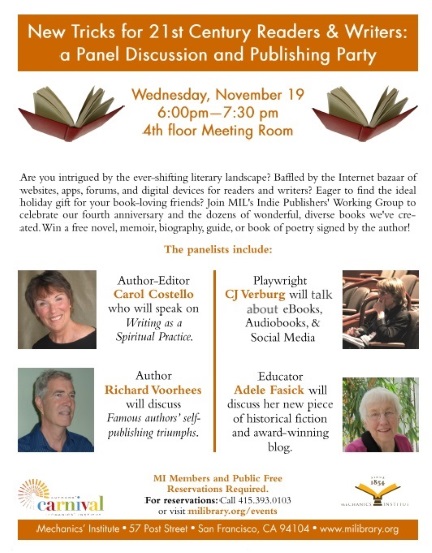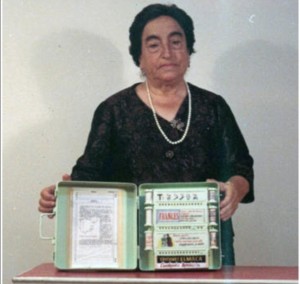If you missed Boom-Books author CJ Verburg’s panel presentation last night at San Francisco’s Mechanics Institute Library, here’s Part 1. Part 2 next week.
 I want to focus on the digital end, since that’s where the action is. And since this is a short presentation, I’ll be making some large generalizations.
I want to focus on the digital end, since that’s where the action is. And since this is a short presentation, I’ll be making some large generalizations.
The first and most important one comes from info-techno wizard Peter Brantley. Book publishing in the 21st century is run by geeks, not by publishers. This is important. How we read, and to a great extent what we read, is no longer shaped by literary experts in New York and London, but by techies at Amazon, Apple, Google, and Microsoft. To that I would add: It’s also shaped by marketing experts more than writers.
The publishing revolution started with print-on-demand. Up until the 2000s, publishers had to gamble on how many copies of a book to print, based on expected sales. Digital printing ended that. Now you don’t have to print any books until somebody orders one. And that meant a writer didn’t HAVE to have a publisher to become a published author.

The next major turning point was e-books. Over my years in publishing, I watched electronic reading gadgets come and go. Like cell phones: the early ones were too big, too clunky, too expensive, and people didn’t see the need. Not any more. You can’t go a month without some new digital device popping up to let you read, buy, and (more and more) borrow books.
From 2010 to 2011, ebook sales doubled.
Author and blogger Hugh Howey reported some amazing figures a couple weeks ago. According to New Republic, between 2008 and 2012, U.S. net income from print books (hardcover and paperback) fell from $10,420,000,000 to $10,003,000,000. That’s a $417 million loss. In the same period, ebook revenue went from $64,000,000 to $3,062,000,000. That’s a GAIN of almost 3 billion dollars. Just this morning, Digital Book World reported that some analysts predict ebooks will overtake print books by 2018.
Back in January 2011, when our Indie Publishers group started, most writers’ goal was to hold a book in their hand with their name on the cover. Next thing we knew, it’s the Wild West: ebooks, audiobooks, interactive books. Now that the dust is settling, what’s left?
 Interactive books never really caught on, outside of specialized nonfiction. When I published my multimedia memoir Edward Gorey On Stage in June 2012, with links to rare film clips and music, what people liked best was the text and pictures. The potential customers for so-called enhanced ebooks mostly stayed with video games, or some combination of ebook, TV series, and film. That’s a hot trend, in fact — about half of recent top-selling e-books have a TV or film tie-in.
Interactive books never really caught on, outside of specialized nonfiction. When I published my multimedia memoir Edward Gorey On Stage in June 2012, with links to rare film clips and music, what people liked best was the text and pictures. The potential customers for so-called enhanced ebooks mostly stayed with video games, or some combination of ebook, TV series, and film. That’s a hot trend, in fact — about half of recent top-selling e-books have a TV or film tie-in.
Moving up fast are audiobooks, thanks to multitasking: people like to listen to a book while they commute, or do chores, or work out. According to Jared Friedman, co-founder of the ebook subscription service Scribd, “Being able to switch between an audiobook and an ebook version of the same title has been one of subscribers’ top feature requests” ever since they launched. Scribd has just added 30,000 audiobooks to its list, moving ahead of Amazon’s Kindle Unlimited. Barnes & Noble’s Nook, which left the audiobook business, just announced they’re getting back in.
Meanwhile, printed books are alive and well. Publishers still sign up authors; they don’t edit manuscripts like they used to, but they still design them and print them and sell them. The big-box bookstores took a hit, but the smaller bookshops they replaced are coming back. Libraries have added computer terminals, but you can see, the stacks are still full.
Basically, what’s happened is that more people are reading more books. Book publishing is not a zero-sum game; thank goodness. The challenge is, with half a million new books coming out every year, how do you as a reader find the ones you’ll like? And how do you as a writer find your readers?
